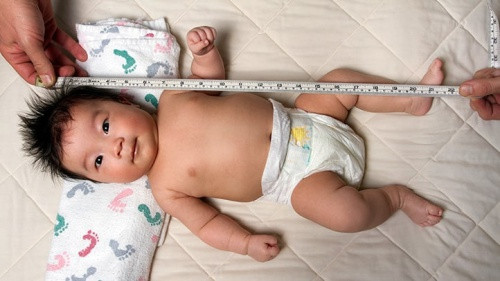Parents' mistakes that make their children short
Malnourished fetuses, babies who are not breastfed at birth, or babies who are given too much calcium as adults... all limit the baby's height development.
Parents always want their children to grow up tall, but if they do not pay attention to providing nutrition for their children from the time they are still in the womb and do not raise them properly, their children will have difficulty growing taller. Below are some mistakes that parents make that limit their children's height growth.
The concept that genes are everything
According to research around the world, adult height is the result of a combination of many main factors: genetics, gender, nutrition, health, physical activity, sleep. Of which, a child's height only depends on genetic factors about 25%.
Children with short genes but given all conditions to develop will maximize the potential of their genes. Maybe parents and grandparents have normal height genes but due to previous poor living conditions, they have not yet revealed these genes. When the next generation is well-nourished, their height will improve.
Similarly, if a child has high genes but does not have the above mentioned care conditions, the genetic advantages will not be promoted and the child will still have below average ability.
 |
Does not create conditions for the fetus to develop well
Many families are not aware of taking care of pregnant mothers in terms of diet, rest, and daily activities. For mothers with severe morning sickness, poor appetite, and weight gain of less than 12 kg in 9 months of pregnancy, they need to be supplemented with milk and take enough necessary vitamins and minerals such as vitamin B, C, calcium, iron, zinc, vitamin A (low dose under 5,000 IU per day).
Not ensuring enough breast milk for the baby in the first 6 months of life
Many mothers, due to the exaggerated effectiveness of formula milk advertisements, think that formula milk is more important. Meanwhile, breast milk is the most suitable source of nutrition for children to develop well.
Mothers who abstain from eating and drinking a lot, causing malnutrition, also lead to insufficient milk for breastfeeding. Breastfeeding mothers need to drink at least 400 ml of milk a day and eat a balanced diet (meat of all kinds, eggs, shrimp, crab, fish, vegetables), only avoiding spicy and sour spices, garlic and fermented foods that can cause digestive disorders. Mothers also need support from their families to get enough sleep and be mentally comfortable to have more milk.
Weaning diet is not reasonable in quantity and quality
This causes children to not have enough energy to develop and especially lack important micronutrients for height development such as vitamin A, D, calcium, iron and zinc. There are cases where children are given solid foods too early, at only 2-3 months. In special cases, children who do not tolerate milk well and are malnourished can be given solid foods earlier but must still be at 4 months. Weaning too early when the child's body does not have enough digestive enzymes can cause children to suffer from prolonged digestive disorders and severe malnutrition.
On the contrary, weaning too late causes a lack of energy and micronutrients needed for the child's normal development because breast milk does not provide enough at this stage.
Besides, it should be noted that bone broth has no nutritional value, no calcium or protein, so if you only use bone broth and flour, without adding meat, eggs, shrimp or fish, your child will be malnourished. Instead, grind the meat and fish, or beat the eggs into the flour mixed with water so that your child can eat both the water and the solids to get enough nutrition.
If the child eats very little or skips meals, the number of meals should be increased. Note, do not add or add too little oil to the child's bowl of porridge, causing a lack of energy in the child's diet. Each meal for a child who has just started eating solid foods is recommended to have 2.5-5 ml of oil, and children who are nearly one year old should increase the amount of oil to 10-15 ml per meal. Lacking this ingredient, the child will not be able to absorb vitamin D and A, which are essential factors for height development.
The notion that children should not eat fish, shrimp, or crab because they are afraid of diarrhea is also incorrect. This causes the child's diet to lack calcium and trace elements necessary for height. When children cough or have diarrhea, they can still eat normally; only in cases of fish, shrimp, or crab allergies in some people with a very low rate of food allergies should they abstain.
Parents should also be careful not to let their children drink industrial soft drinks that contain too much sugar (damages teeth) and have low nutritional value and can easily cause metabolic disorders later in life. Some drinks contain the stimulant cocaine, which also inhibits calcium absorption, greatly affecting height.
Avoid giving your baby too much calcium.
Many families who are concerned about their children's height simply think that they need to supplement a lot of calcium, even in the form of medicine. At the Institute of Nutrition, doctors have encountered children who were given high doses of vitamin D (2,000-3,000 IU daily) even though they were not deficient in vitamin D, and 500-1,000 mg of calcium daily even though they were not deficient in calcium. The consequences were vitamin D and calcium poisoning (the concentration of these substances in the blood was higher than normal), signs of neurotoxicity, digestive disorders, kidney stone deposition, etc.
When detecting that the baby has some symptoms such asconstipation, fatigue, nausea, loss of appetite or bone pain, muscle pain, frequent urination, mothers should take their children to check whether their blood calcium level is too high or not to have timely adjustments. According to nutrition experts, if the body has excess calcium, children can be dwarfed.
Let children get infections (respiratory, digestive) many times (once every 1-2 months)
Studies show that this is the leading cause of limited height development, because children often have poor appetite and use many antibiotics which affect cartilage and bone development...
Not creating conditions for children to exercise and play sports
When the baby is young, the family holds the baby too much, and when the baby grows up, they play on the computer too much, so they do not have an active lifestyle; it does not promote metabolism and transformation, helping the body to develop well.
Therefore, it is necessary to increase physical activity: encourage children to participate in housework, play their favorite sports (especially those with stretching movements such as basketball, pull-up bar, swimming... or running, jumping in place, cycling...) every day for 20-60 minutes depending on the child's physical condition. This helps increase joint fluid secretion, leading to increased growth hormone.
Children sleep too late
Deep sleep will help the body save energy. Especially during night sleep, the pituitary gland secretes growth hormone GH, this hormone will stimulate the growth of children. In fact, children in the city often sleep very late because they are too busy playing or studying, which affects their height.
Children should sleep before 10pm and have regular bedtimes to avoid irregularity.
According to VNE
| RELATED NEWS |
|---|



